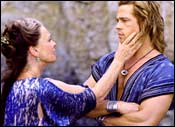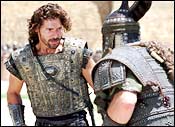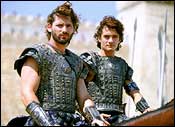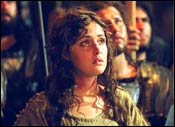 Brad Pitt's broad muscles and derriere could be a big draw for Troy. But the likelihood of the intensely brooding Eric Bana emerging as a star in the $180 million epic is greater.
Brad Pitt's broad muscles and derriere could be a big draw for Troy. But the likelihood of the intensely brooding Eric Bana emerging as a star in the $180 million epic is greater.
Liberally adapted from Homer's Iliad, the film seeks to be a meditation on greed, cowardice, bravery and the follies of war. It has some of the most spectacular battle scenes ever seen in Hollywood. Also, the performance of veterans like Peter O'Toole and relative newcomers like Bana (who starred in last year's disappointment The Hulk) contribute to Troy's dramatic moments.
For much of its length, Troy is devoid of strong emotional conflict.
Another weakness is a bland performance by newcomer Diane Kruger. She plays Helen, whose abduction sets off a huge train of tragedies. The ravishing Kruger is simply unable to stir the viewers here. Plus, there is hardly any chemistry between her and Paris (Orlando Bloom), the prince of Troy. Viewers might even wonder what made the young prince continue to live with the vapid beauty.
Despite these drawbacks, the film could still emerge victorious at the box office.
Much of the film's focus is on Achilles (Pitt) -- the greatest and most fabled warrior who reportedly lived more than 3,200 years. But Wolfgang Petersen's drama comes alive only when Trojan Prince Hector (Bana) confronts Achilles, and when Hector's father Priam (O'Toole) makes a strong emotional appeal for a dignified funeral for his slain son.
Achilles, a mercenary who dreams of immortality, enters the war on behalf of the Spartans following the abduction of Helen, the wife of the Spartan king. Achilles, who is fighting against the Trojans, has no personal stake in the war. For most of the film, he is preoccupied with his own destiny. It is only towards the end, following the death of his cousin, that we see him being transformed by the futility and bloody conflict of war. By then, it is too late for him to withdraw. He pays the supreme price for his ambition, arrogance and cruelty.
Before the war starts, Paris is seen visiting the Greek kingdom of Sparta with his elder brother Hector to forge a peace pact.
 On their voyage home to the fortress kingdom of Troy, Paris reveals he has sneaked Helen aboard. Hector immediately senses his younger brother's audacious act means war and demands to send her home.
On their voyage home to the fortress kingdom of Troy, Paris reveals he has sneaked Helen aboard. Hector immediately senses his younger brother's audacious act means war and demands to send her home.
The script doesn't reveal why Hector gives in to his younger brother who won't send Helen back. But the script is clearer while dealing with the humiliated Spartan King Menelaus (Brendan Gleeson) who convinces his greedy, bloodthirsty brother, the Mycenaean King Agamemnon (Brian Cox), to go to war against Troy to get Helen back.
Despite his dislike for Agamemnon, Achilles joins the Spartans after his goddess mother (Julie Christie in a brilliant cameo) assures him his name will be immortal if he accepts his fate of an early death in the looming battle.
Achilles manoeuvres his ship in such a way that his is the first of the 1,000 war ships to arrive on the shores of Troy. He leads his small force on a risky but successful effort to establish a beachhead beneath the Troy fortress.
While Petersen sets the early war scenes convincingly, offering thrill after thrill, he cannot really convince us as to why Priam and the Trojans easily accept Paris and his queen, Helen.
Among the film's weaker spots is the sequence in which Paris insists upon deciding Helen's fate in a combat with the older albeit stronger Menelaus.
Tension mounts as the confrontation goes awry and Hector is forced to kill Menelaus to save the disgraced Paris.
 Taking credit for the first day's victory against the Trojans despite Achilles' bravery, the egotist Agamemnon also brags that 'history remembers kings, not soldiers.'
Taking credit for the first day's victory against the Trojans despite Achilles' bravery, the egotist Agamemnon also brags that 'history remembers kings, not soldiers.'
The next day, an angry Achilles stays out of the war and makes love to the captured Spartan beauty, the lovely Briseis (Rose Byrne, far more effective than Kruger). She is also a cousin of Hector and Paris. Her role in the film grows as the stage is set for the confrontation between Achilles and Hector.
Troy gains quite a bit of intensity and offers many suspenseful moments following the combat between Achilles and Hector that finally leads to the use of the legendary Trojan horse to gain entry into the Spartan palace.
Pitt, who looks handsome and moves swiftly and gracefully in the battle scenes, is not entirely convincing as Achilles. He delivers a better performance in the company of Bana and O'Toole. Unfortunately, those sequences last for only about 20 minutes.
Bloom is rather effective as the wimpy Paris who comes into his own in the last 10 minutes of the film, when the Trojan leaders are massacred by the Spartans.
Only Bana comes close to matching O'Toole's grand performance.
O'Toole is particularly moving in the scene following Hector's death at Achilles' hand. Achilles drags Hector's corpse to his camp and a disguised Priam comes to meet him to beg for his son's body. This sequence is one of the more haunting, hair-raising and emotionally charged scenes in the film. Thankfully, Petersen avoids making it too melodramatic. The quiet reserve with which the director presents the crucial meeting between the older man and the brash younger one who is still mourning his cousin's death is a big highlight.
 Petersen has made several films including the much-admired Das Boot in his home country, Germany, before settling down in Hollywood in the early 1980s.
Petersen has made several films including the much-admired Das Boot in his home country, Germany, before settling down in Hollywood in the early 1980s.
He has had a varied Hollywood career. Some of his films like the Clint Eastwood-starrer In the Line of Fire were tautly assembled.
But Troy, while boasting of a handful of gripping sequences, including the one in which Achilles's cousin is mistaken for the famed warrior and killed, needed a better script with penetrating dialogue.
CREDITS
Cast: Brad Pitt, Eric Bana, Orlando Bloom, Diane Kruger, Brian Cox, Sean Bean, Brendan Gleeson, Rose Byrne. Peter O'Toole and Julie Christie
Director: Wolfgang Petersen
Writer: David Benioff, loosely based on Homer's Iliad.
Running time: 2 hours and 42 minutes
Rating: R for violence and sexual situations
Distributed by: Warner Bros.






